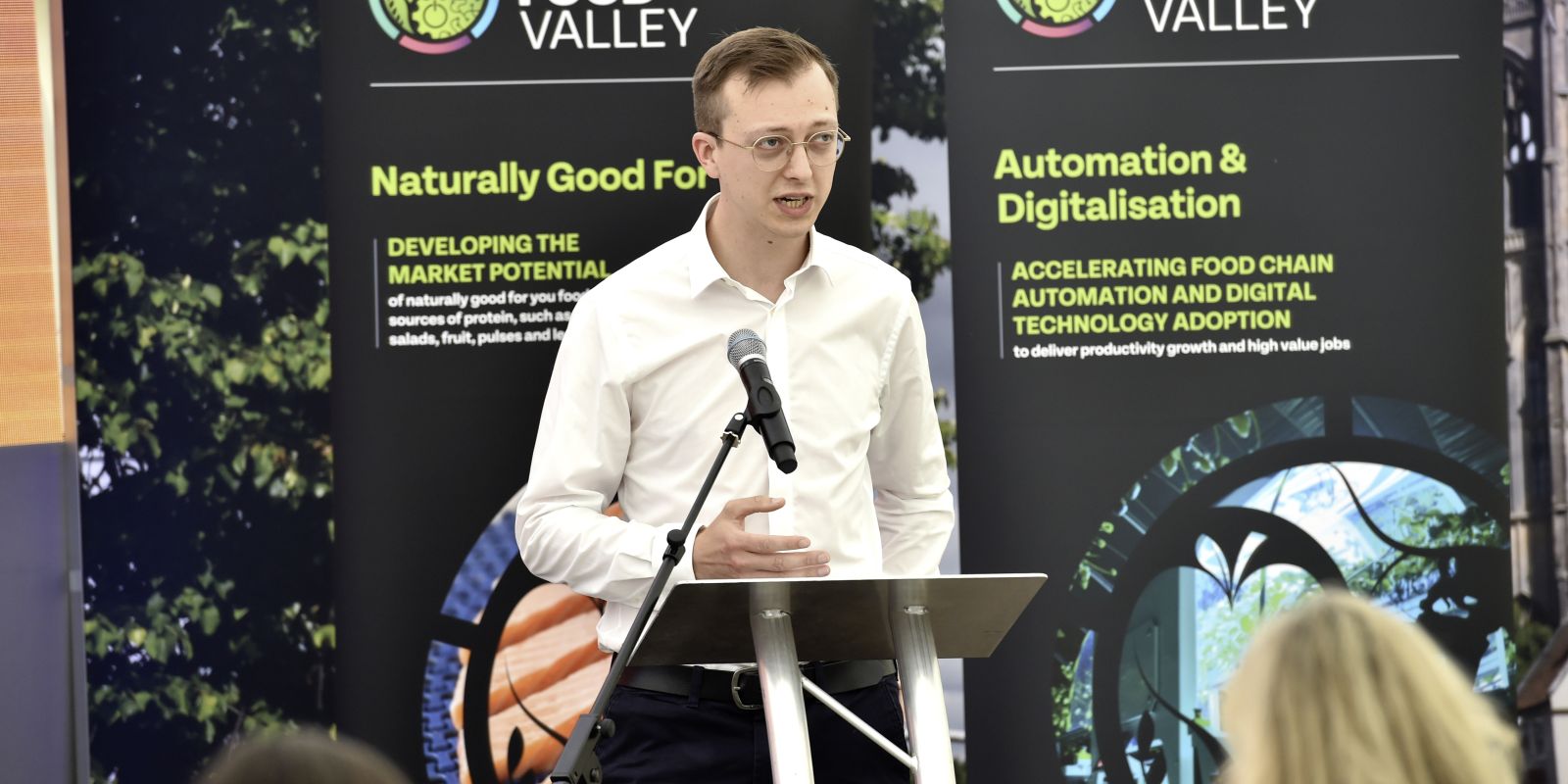SHANE MEHARG INTERVIEW
In this interview Shane Meharg, Research and Marketing Director of the Sadel Group, is interviewed by Jonathan Oldfield, Site Director of Pilgrim’s Europe at Anwick near Lincoln and a member of the Greater Lincolnshire Food Board.
JO: You spoke recently at the UK Food Valley Brunch at the Lincolnshire Show where the new Mayor for Greater Lincolnshire was introduced to the sector and pledged to be an ambassador for our food and farming industry. Why do you think the sector here is particularly strong and what sets it apart from other parts of the country?
SM: Lincolnshire has the largest agricultural produce sector of any area in the country, with major new investments in production across greenhouses, aquaculture and the supply chain.
Lincolnshire’s agriculture, food processing, wholesale, logistics and input suppliers together are worth £4.8bn, support 75,000 jobs and sell over £13.6bn of food and drink a year. Sadel Group is a family business that invests in traditional and operational real estate; we’ve been working to deliver new food supply chain infrastructure in Lincolnshire, operated by Magnavale, a multi-temperature warehousing business that Sadel wholly owns. It has been very encouraging to engage with other businesses and groups through the UK Food Valley that are similarly pushing the industry ahead, such as Simon Pearson and the teams focused on food manufacturing and robotics at the University of Lincoln.
The unique work done by the UK Food Valley is important for British food supply chains and national food security. We’ve engaged with the UK Food Valley for several years now and it was great to be able to share the progress we've made in Lincolnshire with the opening of Magnavale Easton Phase II and our future plans - and how that contributes to the UK Food Valley’s broader ambitions for the area.
JO: You explained to those at the brunch that your brand new development at Magnavale Easton just outside of Grantham is the most energy efficient state-of-the-art cold store plant in Europe. Tell us a little more about it.
SM: The facility is the largest single cold store ever constructed in the UK and marks a major milestone for the UK’s food sector and national food security.
It is designed to enhance efficiency, reduce energy use and emissions, and support food producers, processors and retailers in Lincolnshire and beyond. The building stands at 47.5 metres tall and includes 19 high-speed loading bays to service a capacity of 101,000 frozen pallet spaces.
It’s a fully automated facility, with cranes, conveyors, and monorail systems doing the heavy lifting, and our services include blast freezing, date coding, packing, picking, and import/export support. Nearly 10,000 metric tonnes of steel have gone into its construction, roughly equivalent to a Royal Navy Type 45 Destroyer.
With fully automated pallet spaces, advanced warehouse management systems, and a comprehensive suite of value-added services, Magnavale Easton serves the food sector at every level from storage of bulk raw material straight from farms, to finished goods ready to go into supermarkets.
JO: Can you give us some context on why it is important for the UK to have facilities of this scale and using the technologies you have deployed at the Easton site.
SM: For a long time the UK has seen significant under-investment in its cold chain, relying on outdated cold storage infrastructure. If we don’t modernise our supply chain infrastructure, British agricultural products will be left behind on cost and food production will continue to shift overseas. Instead, we’re doing the opposite by building a food hub to support the future of British agriculture, right here in Lincolnshire.
At its core, this is about building the supply chain infrastructure the UK urgently needs. Much of the national conversation rightly focuses on farmers and supermarkets, but between them lies a vast, complex network of UK logistics and warehousing which employs hundreds of thousands of staff to keep food supply chains running.
JO: You talk a lot about resilience and sustainability. What are the key green credentials at the Easton site?
SM: This isn’t a traditional warehouse, this is a highly advanced, robotic system with significant energy requirements. However, our pioneering plant and equipment makes Magnavale Easton the most energy efficient in Europe meaning we are building for both productivity and sustainability.
As an energy-intensive business, we put a great deal of effort into sourcing and utilising energy in the most efficient and sustainable manner possible. Sourcing our own supply of energy via solar, wind or bio-gas enables us to be more environmentally sustainable, but importantly, also provides a stable commercial energy environment within which to operate.
By automating and electrifying operations, we reduce emissions, enhance food safety, and cut costs across the food chain, futureproofing British food security, which is a win-win for the entire supply chain and the end consumer.
JO: It sounds like a fantastic development and relevant to many of our readers. What are your plans for the future?
SM: The site in Easton has a long history of food production, cold storage and logistics stretching back to 1960s. At its peak there were around 1,200 people employed across a number of factories, processors, warehouses and packing rooms. Unfortunately, over the last 20 years the site slowly declined, and the last factory closed last year with the loss of 115 rural jobs.
We plan to reverse that story and regenerate the site.
Phase I invested £7 million into retrofitting and refurbishing many of the older buildings, and Phase II saw the construction of the new automated cold store. Now, we have secured planning for Phase III of our vision for the site, which includes building a state-of-the-art food production factory and a biodigester which will convert organic waste into renewable energy and high-grade fertiliser.
This new food hub will soon house production, processing, packing, cold storage, distribution and power generation all in one integrated location, forming a blueprint for future food hubs and an example of how Lincolnshire is leading the way in national food resilience.
To find out more or ask about paying a visit, please contact shane.meharg@sadelgroup.com / +44 7989 175401 or Effie.Warwick-John@lincolnshire.gov.uk / +44 07881 006130.



